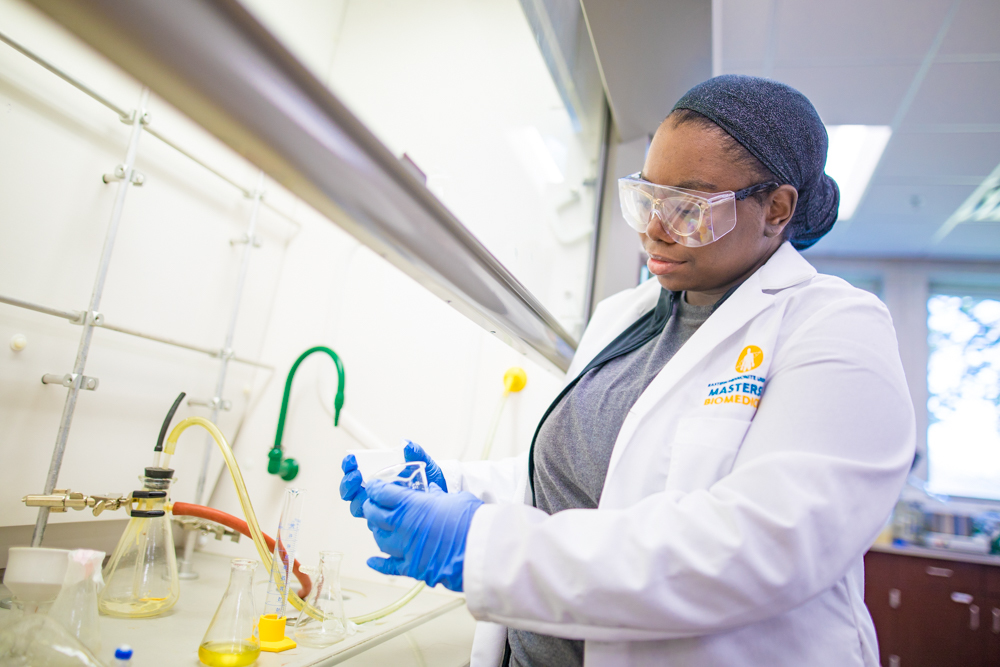From laboratory experiments to quantitative research gathered on campus and in communities far away — 12 graduate students in Eastern Mennonite University’s MS in Biomedicine program participated in an oral defense of their research projects at the end of the fall 2019 semester.
The research “helps students not only to develop mastery in the natural sciences but also to incorporate other disciplines such as social science and ethics. They are able to connect their personal interests with academic studies and other networks beyond EMU,” said Professor Laurie Yoder, who provided research oversight.
For students applying to medical school or other professional health schools, such research projects provide “an important and unique experience that sets them apart from other applicants,” said Dr. Julia Halterman, program director. “Students learn an incredible amount by taking an original research project from start to finish.”
Since 2013, the master’s in biomedicine program has helped graduates prepare for careers as health professionals. The research component is just one unique curricular offering. Students also benefit from a unique approach to cadaver dissection, which many alumni say has provided optimal preparation and a strong background for the rigors of medical school. Several articulation agreements with professional health schools enhance opportunities to matriculate and continue with career goals.
Each oral defense is evaluated by professors in the MS in biomedicine program, committee members, other faculty and other graduate students. Family members, invited professionals and alumni, and other students also attend, Yoder said.
The research component brings graduate students into mentoring relationships with faculty, alumni and other professionals across many disciplines. Committee members for this round of research projects included Esther Tian, professor of engineering; Carolyn Stauffer, professor of social work; Tara Kishbaugh, professor of chemistry; Ryan Thompson and Gregory Koop, professors of psychology; Kristopher Schmidt, professor of biology; Laura Yoder, professor of nursing; and Julia Halterman, director of the biomedicine program.
Master’s candidates and their research topics include:
Adeola Adesuyi, An exploration of the factors that contribute to patient perception of branded and generic drugs;
Donatine Afful, The UNC-53 gene negatively regulates levels of RAC BTPase CED-10;
Heidi Byron, Associations between personality types and their responsiveness to gamification in mobile applications amongst faculty and staff at Eastern Mennonite University;
Hosam Hadid, Acute and post-traumatic stress symptoms may depend on burn injury type;
Alexus Holbert, The psychological impact of genetic testing;
Anna Jemi-Alade, The erosive potential of kombucha, Coke and apple juice on bovine teeth;
Cyndra Jones, Investigating attitudes of first responders toward individuals with opioid use disorders and cocaine use disorder: a survey of police officers and emergency medical technicians in an urban city in central Virginia.
Bowen Lian, Assessing the need for a mild cognitive impairment screening tool in medical and surgical patients at Sentara Rockingham Memorial Hospital;
Claire Reilly, Linking dentists’ education level to their recognition of patients with dental anxiety;
Krystalee Revanna, Gene expression of BAX and BCL-2 in liver and kidney medulla Sprague Dawley rat tissues in response to high salt and high fructose diets;
Nathan Ropelewski, The effects of short-term diets on cognitive function in Mus musculus;
Michelle Van Horn, Comparison of virtues reflection vs. mindfulness-based stress reduction in undergraduate students at Eastern Mennonite University.
